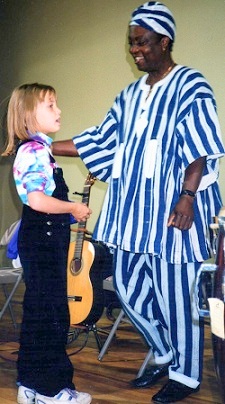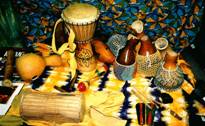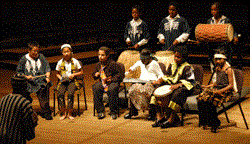TEACHING and SPECIAL OCCASIONS

Babá Ken teaches African percussion, instrumental techniques and music appreciation to students of all ages in schools, colleges, community centers, drum circles, and private lessons. He has served for 8 years as an instructor at UC Berkeley’s Young Musicians Program. His classes share positive cultural values and bring the joy and healing magic of African music to everyone.

He presides with appreciation and dignity at special occasions such as weddings, celebrations, and community gatherings.

Contact us to talk about booking concerts, special occasions, workshops, classes and lessons.
EDUCATIONAL PROGRAMS, LESSONS, and TEACHER STUDY GUIDE
of daily life, to transcend all evils with the joy of music.”
Programs and performances are tailored to satisfy the individual needs. Classes, concerts, and assemblies can involve one or more musicians/instructors, and are often 45-60 minutes in duration, during or after school hours, indoors or out. Each is designed to educate audiences at various ages about West Africa, its people, its cultures, and its role in the development of the human family. This is often accompanied by background music over spoken words, and singing over a gentle, irresistible dance beat that engages the mind and body. Audiences are transported into a village-life experience, where the value of keeping oneself happy while taking care of others is reinforced through folk music and stories, as taught to us by our elders.
African music is at its most authentic and best enjoyed with audience involvement, making everyone part of the show. By the middle of the program, audiences are warmed up and ready to participate enthusiastically. Bodies and minds are brought together through song, and people are up and dancing together. Such irresistible and enjoyable performances have brought both fun and educational satisfaction to both young and old throughout the United States, Canada, and beyond.
What to look for in the programs:• Introduction of names and their meanings, descriptions of clothing.
• Introduction/explanation of musical instruments.
• Explanations of each song with its story and moral value.
• Traditional stories with positive social messages.
• Involvement of children, parents, and teachers by encouraging them to sing and clap along.
• Description of children growing up in the village and their duties.
• The African family structure and loyalty to its positive cultural norms, such as general hard work so all may survive, peaceful conflict resolution, sharing, and responsibility for extended family.
• Q & A session (optional) if time permits.
Babá Ken has led classes, assemblies, and residency programs at many institutions, including:
• UCLA Ethnomusicology Department
• UC Berkeley Young Musicians Program
• Stern Grove Festival Association School Outreach Program
• University High School, San Francisco
• Bay Area Discovery Museum
• JCC Osher Center, Palo Alto
• Ashkenaz Music & Dance Community Center Children’s Program, Berkeley
• Dance for Power, Oakland and Sacramento
• Berkeley Public Schools
• Walden School and Center, Berkeley
• Grand Lake Montessori School, Oakland
• Piedmont Elementary School, Oakland
• Albany High School
• American Chinese School, San Francisco
• Alameda Girl Scouts Camp
• Bishop, California Public School District
• Sedona, Arizona Public School District
PRIVATE OR GROUP LESSONS are available for:
• Understanding and sharing positive African cultural traditions.
• Recognizing and appreciating various African musical styles (with recordings and videos).
• Introduction of African percussion instruments/drums by names.
• Body rhythm and counting methods in 4/4, 6/8 and 12/8 meters.
• Memorization techniques.
• Playing the clavé, shekere, and African bells.
• Holding down a groove with one or two drums.
• Learning folk songs and stories.
• Singing while playing an instrument.
• Drum call-and-response technique.
• Organizing a percussion and drum ensemble.
• African polyrhythmic patterns: how to find that elusive downbeat.
• Listen and learn to play with others in harmony.
• Improvisational skills and techniques.
• African-style guitar and/or bass, including finger-picking techniques.
• Techniques for playing African music with drum set, congas, talking drums, and many more instruments.
TEACHER STUDY GUIDE and BACKGROUND INFORMATION
NIGERIA is in WEST AFRICA:
A large nation on the Atlantic coast of West Africa, Nigeria is the most populous among the 52 countries of the African continent. Nigeria’s main export is oil, along with other natural resources such as rubber, cocoa, palm oil, natural gas, and timber. The climate ranges from rainy and tropical along the southern coastal regions to dry desert in the North. Along with over five hundred other dialects, three major languages are spoken by the country’s largest ethnic groups: Yoruba in the Southwest, Ibo in the Southeast, and Hausa in the North. The general business language is English, but often ‘Pidgin English’ (aka broken English) is spoken among everyday people.
From the many ancient cultures represented in Nigeria comes an abundance of folklore, philosophy, tradition, song, and music. The traditional social order of many Nigerian groups is based on respect for age, and important decisions are made through discussion and consensus among elders. Hereditary chiefs and other rulers are subject to the scrutiny and restraint provided by groups of counselors who are free to respectfully voice their ideas.
Music, dance, and role-playing by performers and festival masqueraders also provide outlets for social commentary. Traditionally, the techniques of parable, proverb, satire, parody, ironic understatement, and mimicry are employed to minimize unpleasant confrontations while allowing criticism to be politely indirect, hilarious, and yet profoundly understood by all. Everyone is part of the performance, and contributes to it with voices, dances, claps, laughter, enthusiasm, and choices of attire.